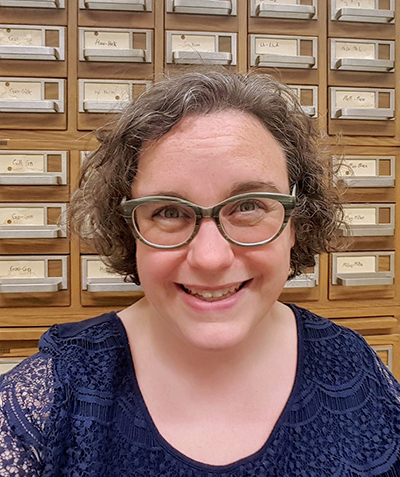
As Dewey editor at OCLC, Violet Fox is in a rare position of influence over the classification system that both rules the librarianship world and at times drives it batty.
In her role, the 2013 Information School MLIS alumna is one of two people primarily in charge of creating numerical additions to the Dewey Decimal Classification, which was first devised in 1876. As powerful as it is, the system still contains outdated references that frustrate users and prompt calls for change. Part of Fox’s job is to facilitate ways to make those changes happen.
“All of the things that I do are mostly trying to convert complaining into action,” said Fox, whom Library Journal named a “Mover and Shaker” in 2019. She works at the Library of Congress, in Washington, D.C., working closely with those who assign Dewey number to new works. Dewey is owned by OCLC, a cooperative organization that provides services to libraries around the world.
“I make up numbers for Dewey. That’s really exciting to be the person who does that,” she said. More than that, though, she makes changes that allow everyone to feel welcome to access information, which she sees as the most important aspect of her job.
“In libraries, we tend to think of the catalog of just the purview of a small group of people, of the catalogers, but it really is a reflection of the library and the library’s values,” she said. “So it’s vital that we use terms that reflect people’s reality.”
Changes to Dewey and Library of Congress Subject Headings happen in several ways. Fox communicates with librarians and proposes changes when she sees a way to address a common complaint. She involves librarians in the process to propose their own changes and created a website, Cataloging Lab, where people collaborate on proposals. And she has worked with iSchool classes to propose additions and changes to subject headings, including a successful effort with one of Principal Lecturer Helene Williams’ classes to add “cultural appropriation.”

“She's a terrific advocate for change, and at the same time she understands bureaucracy, whether the UW's or the Library of Congress,” Williams said. “And she works to create pathways to progress through those institutional barriers.”
As much responsibility as Fox has for Dewey, her power isn’t absolute. The final word goes to the Dewey Editorial Policy Committee, a 10-member international board. The process is slow by design; as frustrating as the slow pace of change can be, imagine how frustrating it would be if the systems were in disarray from constant change.
Fox is active in the online #critlib movement, which considers critical approaches to librarianship and seeks to apply social justice principles to library work. She runs a website devoted to the topic — critlib.org — and will present on “critical cataloging” at a pre-conference session this June at the American Library Association Annual Conference in Chicago.
“A lot of critical cataloging is about subject access, like Dewey things or Library of Congress subject headings,” she said. “There are many that can be old-fashioned or even offensive.”
For example, a group of Dartmouth University students stirred a controversy in the mid-2010s when they requested that the Library of Congress change its “illegal aliens” subject heading to “undocumented immigrants.” The debate turned political and landed on the floor of the U.S. House of Representatives. The subject heading remains unchanged, but Fox has worked since then with individual libraries that wish to create workarounds.

“People get frustrated that things do not change as fast as they should, in their minds,” said Joseph Tennis, an associate professor who was one of Fox’s instructors at the iSchool. “Then you realize that it’s a mixture of technology, policy, politics and who’s got influence over that, so the work that Violet’s doing is very important.”
Tennis noted that such work goes largely unnoticed until issues arise over outdated terms, something that has happened with the evolution of language in the context regarding the trans community. For example, he said, “transsexualism” remains a Library of Congress Subject Heading despite being considered an offensive term by many transgender people. Biographies about transgender, or trans, people are grouped with books that pathologize their identity, a harmful situation for library visitors to encounter.
Ensuring that people can find information without feeling excluded is what makes classification work so meaningful, Tennis said: “If you’re going to the shelf and you’re looking for books that are about people like you, you want to make sure that it’s organized respectfully and doesn’t cause harm.”
Fox, who counts Tennis and Associate Professor Emeritus Allyson Carlyle among her mentors at the iSchool, took those lessons to heart as a residential student in the MLIS program. She got involved in research and surprised herself by becoming a leader among her peers. When she graduated, classmates voted her the winner of the 21st Century Librarian Award.
“We had such a close bond as a cohort and I can’t tell you how much that has shaped the way that I see librarianship in general just as such a collaborative profession that it’s really been so important to me to take that forward,” Fox said.
Photo at top by Susan Yin on Unsplash.
